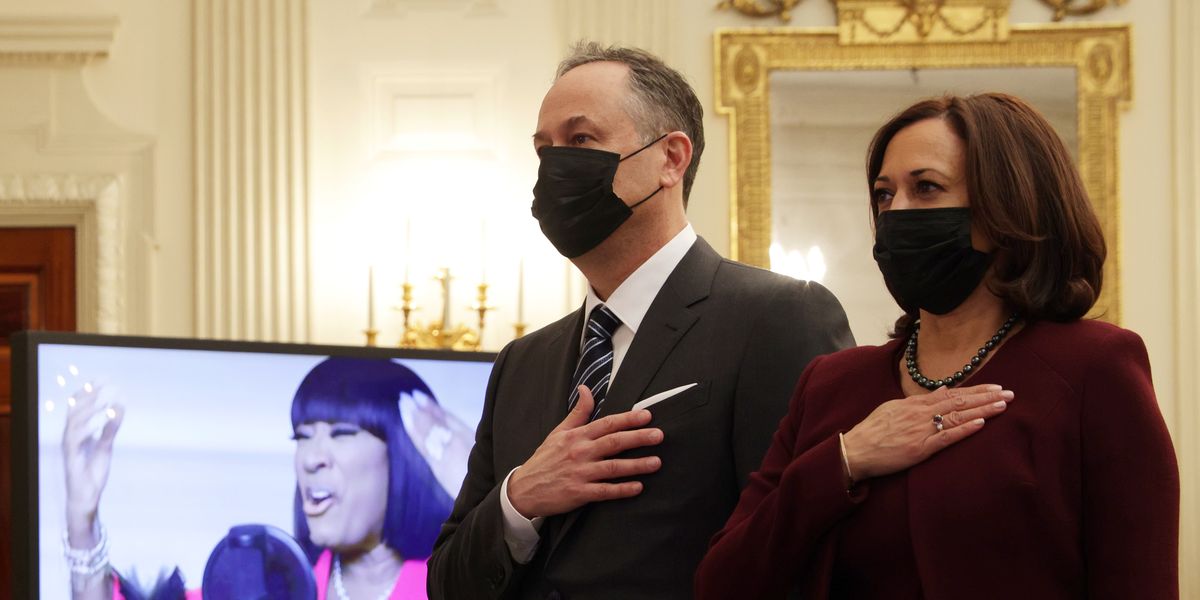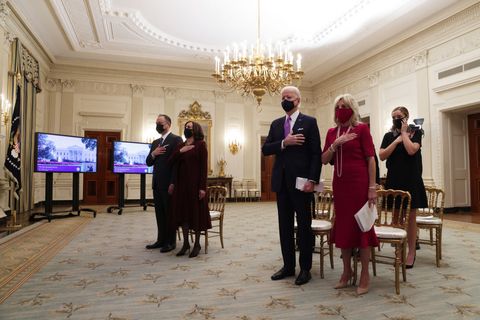Fashion was not meant to be the focus during this week’s inauguration, but the swearing in of President Joe Biden and Vice President Kamala Harris became a runway anyway. We witnessed independent designers on the main stage, a show of unity through the color purple, Dior Air Jordans, and mittens becoming the accessory of the year.
On the tail end of the historic event, Harris continued her streak of using fashion as a vehicle for promoting designers we should be paying attention to. While attending a prayer service yesterday, a tradition that dates back to George Washington’s inauguration, Harris wore a custom, berry-colored set by Nepalese American designer Prabal Gurung, a continuation of the purple thread woven earlier this week.
Gurung, who is no stranger to dressing high-powered women (Michelle Obama and Oprah are fans), has a track record of trying to do what’s right on the runway. During his 10th anniversary show in 2019, he posed the question “Who gets to be American?”, using fashion to examine and criticize the previous president’s handling of the country. The designer is known for inclusive casting, calling out racial injustice, and using his platform to advocate for change. Born in Singapore, raised in Kathmandu, Nepal, and now based in New York City, Gurung is living the American Dream, one made even brighter when Harris stepped out in his designs.
Harris’ decision to wear Gurung solidifies the power style can have and the importance of top-down support for indie brands. Gurung reflects on what it meant to see our first female, Black, and South Asian Vice President wear his clothes and why we need to continue doing the work. Read on for our interview with the designer below.
As an immigrant, how did it feel to witness our first South Asian Vice President (and the daughter of immigrants) being sworn in?
This week has been incredibly emotional for me. I came to the United States to realize my American Dream of becoming a fashion designer. Having been born in Singapore, raised in Nepal and India, and then living in Australia and London, I always looked at the United States as a land of endless possibilities. My story, and what I have been blessed to achieve, could really only happen here.
Yesterday, when they swore in Kamala Devi Harris as the first female, Black, and South Asian Vice President of the United States of America, I was overwhelmed with hope, gratitude, and profound joy. Hearing a name that sounds familiar and seeing her face and thinking of that iconic image of the Vice President wearing a sari makes me think of the strong women of my family, and the inspiring young girls my organization Shikshya Foundation Nepal helps to educate. They can all now look to one of the highest offices in the world and see someone that looks like them. This moment belongs to every marginalized person who has ever been discouraged of dreaming big—because they now see that they can achieve anything.
How did it feel to be directly connected to that moment?
I feel profound gratitude. I am also energized for what comes next. We cannot let our work stop at the ballot box. In order to achieve true progress and unity, we must all continue to unite and work towards a better future for our nation. Seeing Vice President Harris wearing our designs the day after being sworn in really speaks to that notion for me. They are beginning their work, and so should we.
How do you think fashion fits into the narrative of American politics?
Fashion does not operate in a vacuum. As designers, we are influenced by the world around us, and we also contribute enormously to the global economy. To me, American fashion is the heart and soul of the industry. We are made up of predominantly small independent designers and exciting new talent. I was so thrilled to see my colleagues like Christopher John Rogers, Pyer Moss, Markarian, and Sergio Hudson represented.
On your Instagram, you wrote about the hope you feel for our country moving toward a more equitable future. In what ways do you think the fashion industry can help?
We have to remember that this is not about a moment, but a constant movement towards racial and social justice and equality. We have to be diligent in our work and continue to come together as an industry to advocate for change and put it into action.
This content is created and maintained by a third party, and imported onto this page to help users provide their email addresses. You may be able to find more information about this and similar content at piano.io

